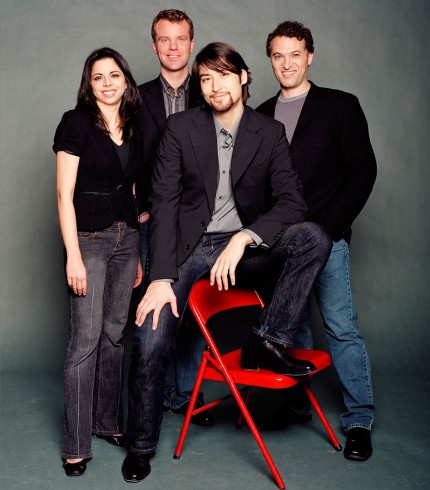North Shore Chamber Music Festival opens with lyrical Dvořák and effervescent Mendelssohn

The North Shore Chamber Music Festival opened its second season Wednesday night at the Village Presbyterian Church in Northbrook. And for those in attendance—and those who listened to the live broadcast on WFMT—the superb performances certainly got the weeklong festival off to a rousing start.
Once again, violinist Vadim Gluzman, festival artistic director, and pianist Angela Yoffe, executive director, have fielded a stellar lineup of colleagues to come together for a bracing array of repertoire, freely mixing chamber chestnuts with contemporary rarities in three programs.
There were some surprises along the way. Those expecting the scheduled Bartok Violin Rhapsody No. 1 and Beethoven Quartet in A minor, Op. 132, instead got Dvořák’s American Quartet and another work by Beethoven, but given the level of advocacy Wednesday night, few seemed to mind.
Gluzman and Yoffe led off with Beethoven’s Violin Sonata No. 1 in D major, Op. 12, no. 1. In this early work, one gets the sense of the mercurial young Beethoven bursting with more ideas than he can profitably use. The married collaborators displayed their close artistic bond, with Gluzman’s sinewy tone and bold projection matched by Yoffe’s sparkling keyboard work, the couple consistently bringing out the rhapsodic inspiration of the opening Allegro. The central variations were fully characterized, by turns dramatic and yearning, and the fiery account of the rollicking finale offered an admirable balance between Beethoven’s restless drive and lyric fantasy.
Initial disappointment that Dvořák’s much-played Quartet in F major was replacing the advertised Beethoven quartet was soon dispelled. To make this thrice-familiar chamber warhorse sound newly minted is no small feat, yet with the Pacifica Quartet playing at their considerable finest, not a single bar sounded routine.
The mix of dynamic vigor and reflective lyricism was evident from the opening bars in the players’ fresh, light-toned approach, as with first violinist Simin Ganatra’s airy, feather-light floating of the second theme. Ganatra’s phrasing and silky vibrato in the Lento was replicated exactly by cellist Brandon Vamos (the playing of second violinist Sibbi Bernhardsson and violist Masumi Per Rostad at the same high level throughout). The Pacifica’s refined tone and wide dynamic range underlined the movement’s sweet nostalgic ache, as in Vamos’s elegiac solo near the coda, an end pin mishap apart.
The vigorous Scherzo firmly brought out the Czech rhythms and the Pacifica’s fleet and energetic finale capped a performance that made one appreciate the craft and thematic richness of Dvorak’s quartet anew.
One of the festival’s finest features is its breezy mix of popular repertoire with offbeat contemporary works. Wednesday’s musical oddity was Alan Ridout’s Ferdinand the Bull, based on Munro Leaf’s 1936 children’s tale about a young bull who would rather smell flowers than fight in the bullring.
Ridout’s concise setting for violin and speaker was presented here by a triumvirate with Gluzman joined by duo narrators, Henry Fogel and Kirsten Moomey Merilo doing sign language. Gluzman attacked the violin pyrotechnics with all the iron-fingered intensity required of the Tchaikovsky concerto. Merilo’s flamboyantly dramatic signing certainly lent a theatrical element to this slight piece—probably a work better suited for young people’s concerts—while Fogel’s unfussy, straightforward narration captured the essential sweetness of the tale best.
Mendelssohn’s Octet closed the evening with Gluzman and the Pacifica members joined by violinist Olga Kaler, violist Milena Pajaro-van de Stadt and Mark Kosower, principal cellist of the Cleveland Orchestra. With its string-writing ingenuity, melodic richness, and astonishing maturity, the Octet, composed at age 16, is an even more remarkable achievement than Mendelssohn’s contemporaneous Midsummer Night’s Dream Overture and first two string quartets.
With Gluzman in the first chair, the opening Allegro had an even more concertante feel than usual with the violinist’s gleaming tone and bravura playing tending to dominate the textures. The full ensemble came into its own in the Andante with much lovely playing in this lilting lullaby-like movement. In the Scherzo, the players put across the elfin charm of the skittering string lines, and the effervescent finale was thrown off with fizzing virtuosity by all without sacrificing an essential Mendelssohnian playful charm.
Gluzman introduced the Ridout by saying that Ferdinand the Bull “does not need an introduction.” Maybe not for some parents and children in the audience, but the rest of us would have liked to know bit more about the work and the composer. More broadly, while the brief informal spoken introductions are nice, they’re no substitute for program notes with specific information about the music, especially with repertorial byways of Schnittke, Golijov and Ridout on the menu this year.
The festival continues 7:30 p.m. Friday with Schubert’s The Shepherd on the Rock, Shostakovich’s String Quartet No. 8, Schnittke’s Moz-Art and Brahms’ Piano Trio No. 1 in B minor. nscmf.org; 847-370-3984.
Posted in Performances




